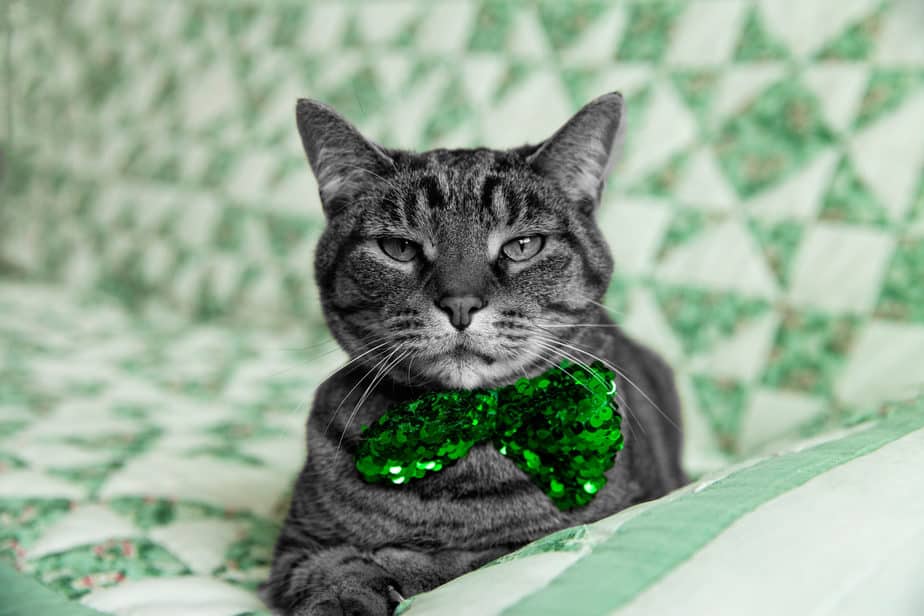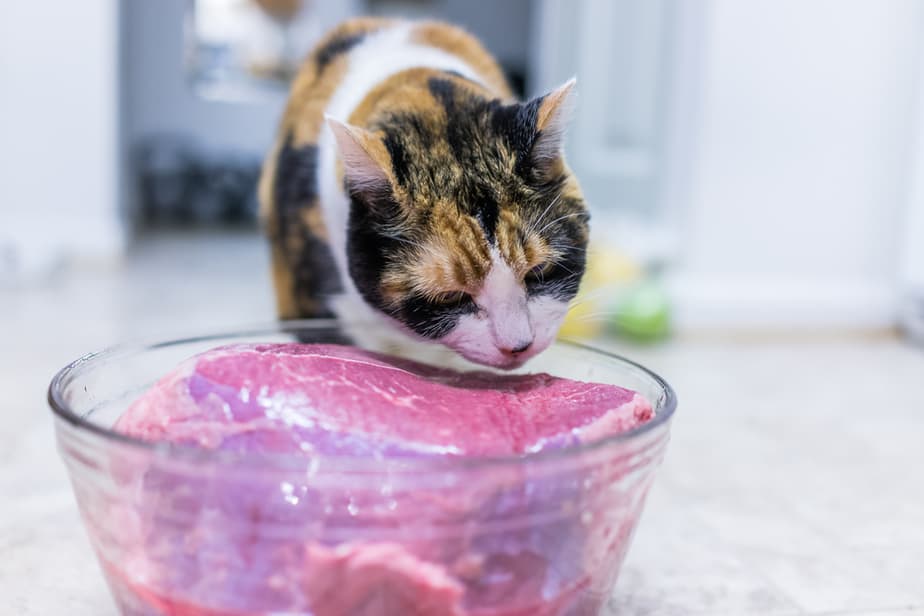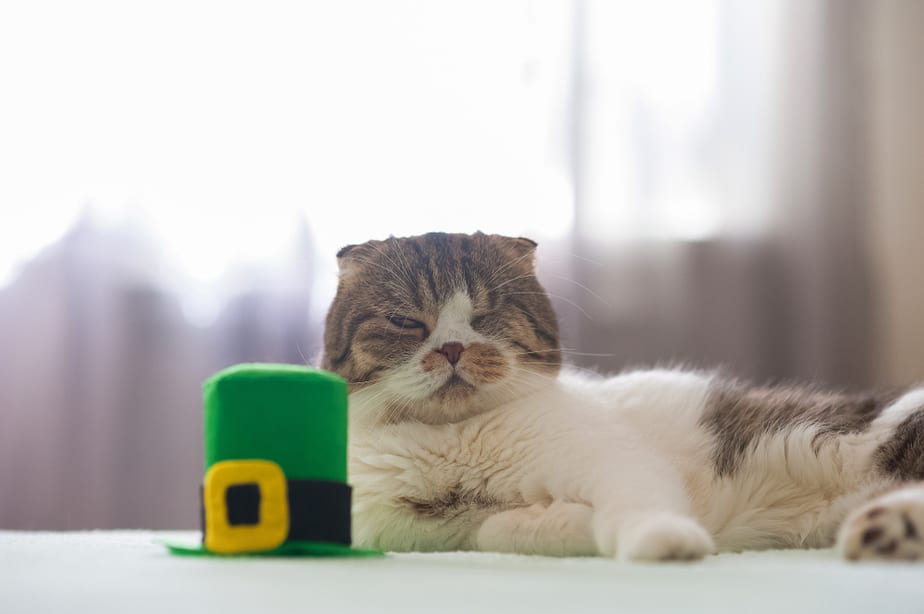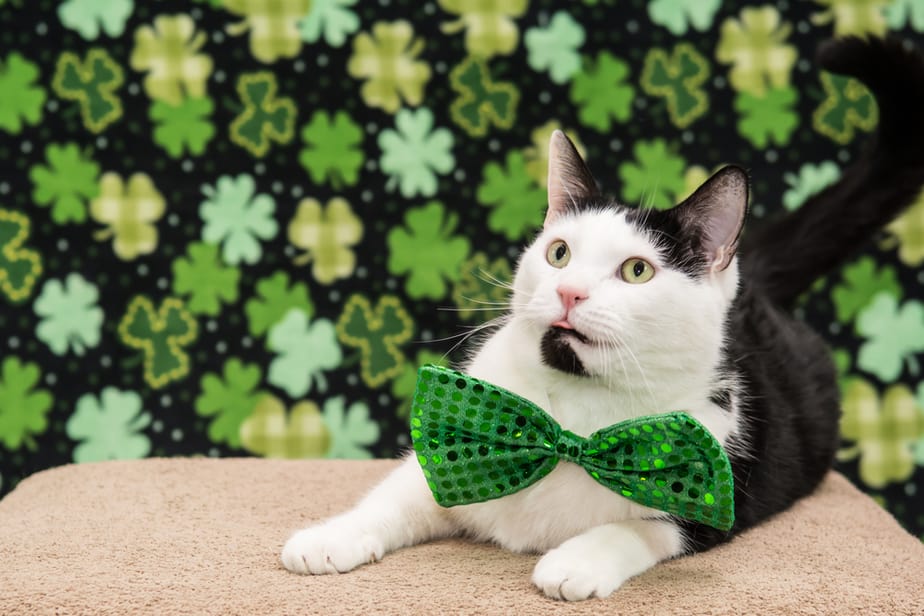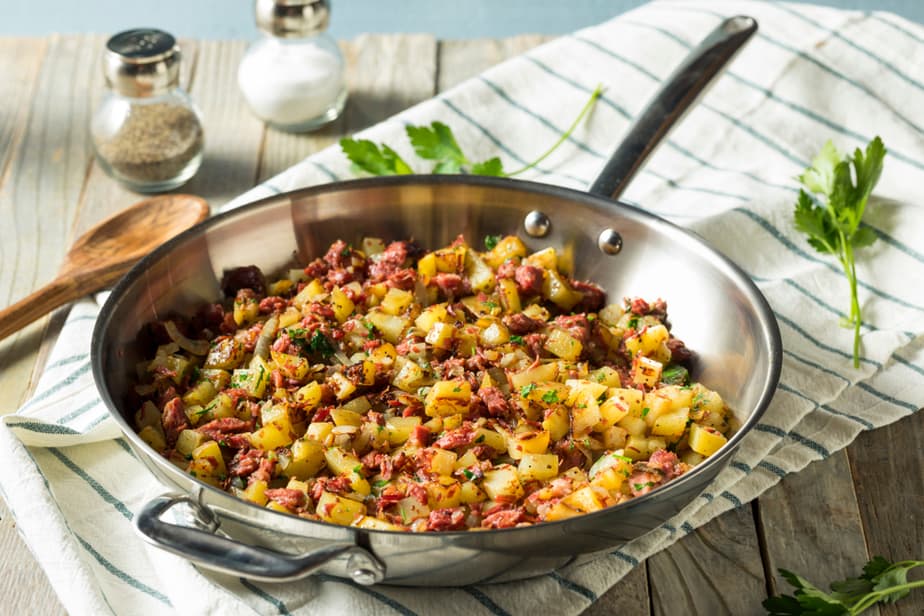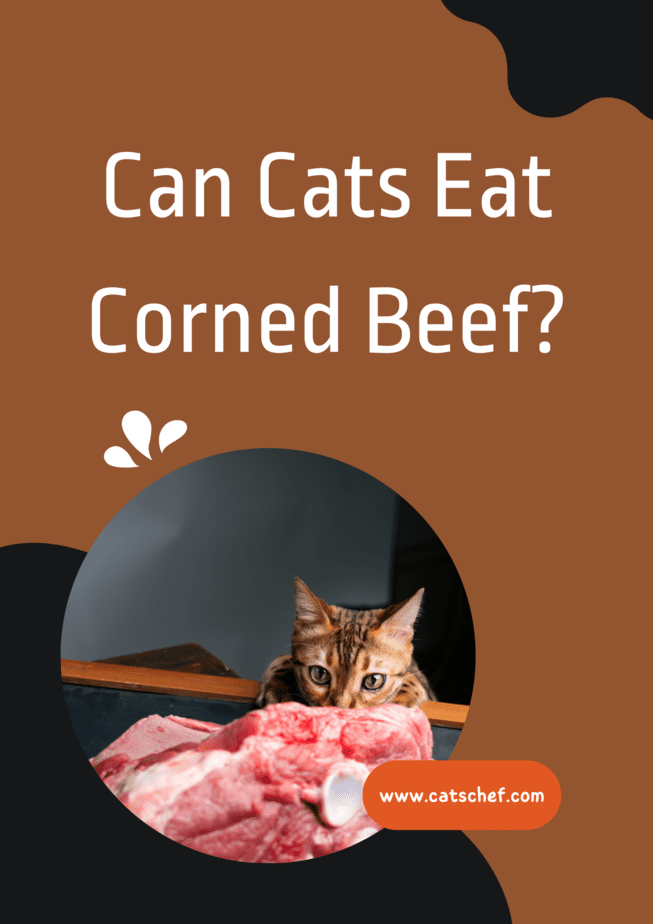📖 Table of Content:
Corned beef and cabbage are some of the most popular dishes on St. Patrick’s Day. With all these amazing dishes, your cat’s presence adds to the warm atmosphere. But can cats eat corned beef?
Next to Shamrock pancakes and green oatmeal, corned beef is a delicacy that can’t be avoided. Paddy’s Day can be a handful and sometimes it can be hard monitoring your feline.
This means a great opportunity for your furry thief! We know those greedy paws aren’t going to wait for you to offer them some food.
Cats are mischievous creatures that like to take matters into their own hands. While this personality trait can be advantageous at times, sometimes it can be a bit too much for a cat parent to handle. With all the guests arriving, it’s mission impossible defending the corned beef!
Is corned beef okay for cats to eat?
Unfortunately, you’d have to keep this dish away from your pet. And if you’re wondering whether cats can eat corned beef in small amounts, the answer is still no.
I’ll admit, the name of this dish can be rather deceiving, which could trick you into thinking it’s okay to feed your kitto corned beef. However, there’s more to this delicacy than just plain beef.
Corned beef is made by dry curing. It’s similar to the way prosciutto and other ham are made. If you’re dry-curing beef at home, it implies that meat is left covered in salt for a full day.
But cats can eat beef, right?
It’s true that cats can eat beef, but the real concern about any meat is the way it’s prepared. We know it’s always about quality and not quantity, but you must also be careful to not overfeed your pet.
Beef is a great source of protein and other nutrients essential for a feline’s growth. Cats are carnivores, which means they rely solely on meat intake for healthy development.
However, processed meat in any way can’t offer as many advantages as plain, cooked meat. While certain nutrients are lost during the process, other benefits are gained.
Just like beef jerky, corned beef isn’t the healthiest choice for your furry friend. We know you want to celebrate St. Patrick’s Day and the act of sharing food is great. However, sometimes sharing isn’t caring, especially when it comes to harmful foods.
Why is corned beef bad for cats?
One of the most important reasons cats shouldn’t eat corned beef is salt. The amount of salt found in corned beef is alarming. Despite beef being an important source of nutrients for cats, it’s best to refrain from treating your pet to this dish.
Due to the high sodium levels, corned beef will do more harm than good to felines. Your four-legged companion doesn’t know why salt is bad for her. If you’re oblivious to the reason, then you’ll want to read on!
Salt poisoning
Sodium is a nutrient that’s important for a cat’s health. It assists in transmitting nerve signals, contracting and relaxing muscles, and maintaining adequate water and mineral balance.
Also, without salt, our lives would be really dull, right? It adds to the flavor and some foods would be really bland without it.
Besides, sodium is used in preserving foods for a longer shelf-life, such as Slim Jims. But even with all the good things salt offers, it comes with a price.
Felines require really small amounts of this mineral to keep their fluids in balance. Excessive salt intake is highly detrimental to your pet’s health.
If your cat is fed foods that are high in salt or she’s got regular access to these foods, she can be in danger. Consuming salty foods like corned beef can cause sodium poisoning in felines.
This is no joyride – for cat or cat owner. If you notice your corned beef is missing, you should immediately look for the main suspect.
A dead giveaway is usually those stained pawprints on the floor and the sounds of a satiated cat – they don’t tend to hide their pleasure. If that’s the case, there’s your answer to the question of whether cats can eat corned beef.
Sure, they can, but what are the consequences? If you made sure to dry-cure meat the best way possible, you probably dunked it in salt and covered it with some more. This could easily poison your feline, so be on the lookout for any symptoms.
The most common symptoms of sodium poisoning include vomiting, diarrhea, excessive thirst and urination, as well as seizures and tremors.
Can cats eat corned beef because of other spices?
Spices are what make good foods brilliant. They add to the flavor and totally turn our worlds upside down. However, the same can’t be said for cats, unfortunately. If you want to share some corned beef with your pet, she’d be better off without it.
Next to salt, corned beef has its signature taste because of other spices such as black pepper, mustard seeds, cinnamon, ginger, and cloves – especially if you’ve opted for the pickled corned beef.
While this may look and taste to you like a heavenly blend, your cat will disagree. None of these are entirely safe for feline consumption. For instance, cinnamon and black pepper are both used as cat deterrents because of their repulsive smell.
Cloves and allspice, on the other hand, are highly toxic to cats as they contain eugenols, which can cause liver toxicity in felines. If your cat has ingested cloves and presents with symptoms such as vomiting, staggering, and seizures, get to the nearest vet as soon as possible.
Can cats eat canned corned beef?
Regular corned beef and canned corned beef are very similar. Because of the high levels of sodium and other preservatives used to extend shelf life, it’s certainly not a good choice for your cat’s diet.
It’s not necessary to boil corned beef. However, this doesn’t imply that it’s the ideal supper for your beloved pet. While cats will want to eat corned beef in a variety of forms, you should be aware of the risks.
Apart from salt, other preservatives found in canned products such as Vienna sausage can harm your cat. Food additives like polyphosphates are also used to extend the shelf life of canned corned beef. These are additives in processed foods that act as stabilizers or emulsifiers.
Potassium chloride is another stabilizer used to provide flavor while keeping salt levels low. When it comes to cats, though, any form of added salt is harmful to their health.
Can cats eat corned beef hash?
We know why corned beef is bad for felines, but can cats eat corned beef hash? Is there any difference? A couple of added ingredients isn’t that much of a difference if that’s what you’re thinking.
Potatoes, vegetable oil, sauce, as well as onion, are all found in corned beef hash. These ingredients are at the very least not beneficial to your feline, and some are even highly toxic.
Also remember, cats can’t digest plant matter properly because they’re carnivores. Certain nutrients and their health benefits will go to waste because of your cat’s inability to properly digest them.
To get back to the plant-based ingredients, potatoes and onions are dangerous for your cat. Now we all know that potato is a staple in many kitchens and is widely used to make all sorts of dishes – from snacks like potato chips to full dishes like corned beef hash.
What you should be careful about when it comes to potatoes are the alkaloids. Potatoes, just like eggplant, are a member of the Nightshade family. These members possess a certain alkaloid called solanine.
If your cat consumes Nightshade veggies regularly, she could get solanine poisoning. The most common symptoms of solanine poisoning include dizziness, vomiting, diarrhea, and irregular heartbeat.
When it comes to onions and garlic, they’re entirely off-limits for felines. All foods from the Allium plant family are harmful to your cat’s health by damaging red blood cells, resulting in anemia.
So, your cat is better off without any sort of garlic or onion, whether powdered, cooked, or uncooked.
Oil isn’t harmful to cats, but it’s also ineffective. Your cat will most likely have trouble digesting it. If you must use oil, rather opt for extra virgin olive oil. It’s least likely to give your cat a stomach upset. Keep an eye out for digestive distress if you suspect she’s consumed too much oil.
What about corned beef and cabbage?
We’re sorry to disappoint you, but cabbage doesn’t improve the scenario by much.
Sure, cabbage is a healthy, nutritious, and fiber-rich treat for cats when eaten in moderation. Cooked cabbage is simpler to digest and safe for cats to consume. It can help cats with digestion, cancer prevention, and skin and fur health.
Some finely shredded cabbage over her wet food is a fantastic approach to gradually include it in her diet, but do so in moderation to avoid any negative consequences.
However, don’t forget that it’s still plant material that doesn’t mix well with cats. Sure, some plants like asparagus may boast plenty of health benefits, but others not so much.
The amount of cabbage in this dish doesn’t change the way things are. If you were asking whether cats can eat corned beef and cabbage because it’s meat and veggies, and you were hoping for a positive answer, you were deceived.
To wrap up
To conclude whether cats can eat corned beef, we have outlined the main risks of allowing your furkid to sample this cured meat. We also went into detail about sodium toxicity and how horrible the outcomes might be.
A tiny piece of corned beef isn’t likely to cause these problems, but why risk it? You already have enough on your plate (pun intended) with St. Patrick’s Day just around the corner – you don’t need another thing to worry about!
Read more: Can Cats Eat Ground Beef? Is This Good For Your Furry Chief?
